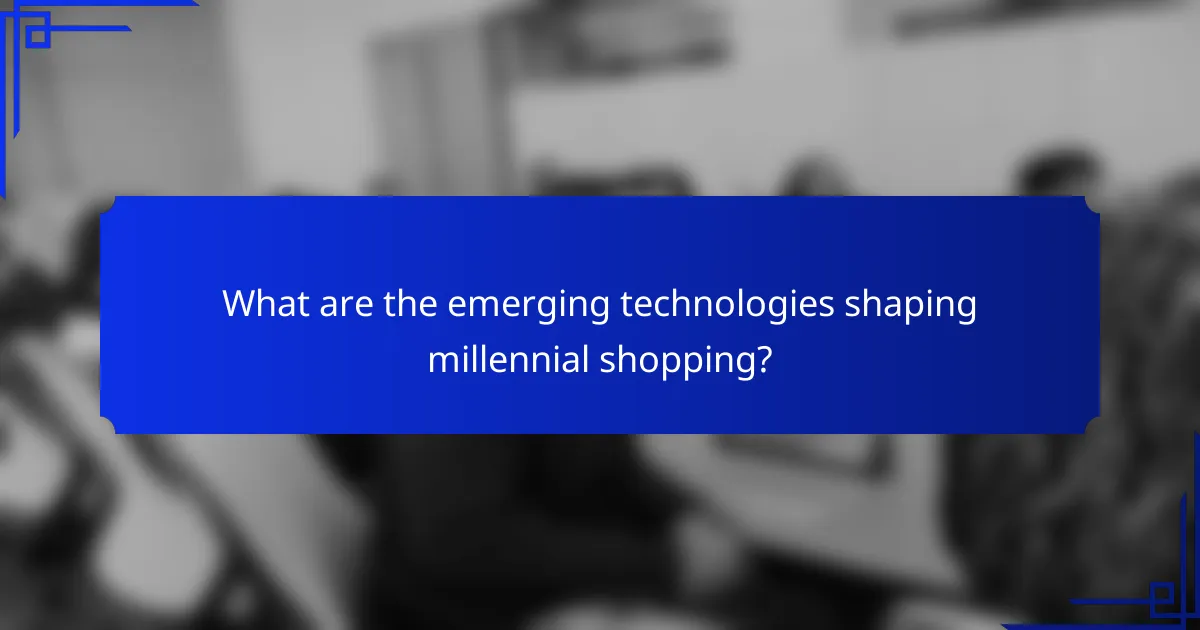Millennials are transforming the retail landscape with their unique buying habits, which prioritize convenience, sustainability, and authenticity. Their strong inclination towards online shopping, coupled with a commitment to eco-friendly products and personalized experiences, reflects their values and influences their purchasing decisions significantly.

What are the key trends in millennial buying habits?
Millennials are reshaping the retail landscape with distinct buying habits that emphasize convenience, sustainability, and authenticity. Key trends include a strong preference for online shopping, a commitment to eco-friendly products, and a desire for personalized experiences.
Preference for online shopping
Millennials favor online shopping due to its convenience and accessibility. A significant portion of their purchases occur through e-commerce platforms, often driven by the ability to compare prices and read reviews quickly.
Retailers should optimize their websites for mobile use, as many millennials shop via smartphones. Offering features like one-click purchasing and easy returns can enhance the online shopping experience.
Emphasis on sustainability
Millennials are increasingly prioritizing sustainability in their buying decisions. They tend to support brands that demonstrate eco-friendly practices, such as using recyclable materials or reducing carbon footprints.
Businesses can appeal to this demographic by highlighting their sustainable initiatives and offering products that are ethically sourced. Transparency in sourcing and production processes can build trust and loyalty among millennial consumers.
Influence of social media
Social media plays a crucial role in shaping millennial buying habits. Platforms like Instagram and TikTok serve as key channels for product discovery and brand engagement.
Brands should leverage social media marketing strategies, such as influencer partnerships and user-generated content, to reach millennials effectively. Engaging with consumers through interactive content can also enhance brand visibility and appeal.
Desire for personalized experiences
Millennials seek personalized shopping experiences tailored to their preferences and needs. They appreciate recommendations based on past purchases and personalized marketing messages.
Retailers can utilize data analytics to create targeted marketing campaigns and personalized product suggestions. Implementing loyalty programs that reward individual preferences can further enhance customer satisfaction.
Focus on brand authenticity
Authenticity is a significant factor in millennial purchasing decisions. They tend to favor brands that are transparent about their values and practices, often gravitating towards those with a strong social or ethical mission.
To connect with this audience, brands should communicate their story and values clearly. Engaging in community initiatives and demonstrating commitment to social causes can strengthen brand loyalty among millennials.

How do social media platforms influence millennial purchasing decisions?
Social media platforms significantly shape millennial purchasing decisions by providing a space for product discovery, peer recommendations, and influencer endorsements. These platforms create a dynamic environment where brands can engage directly with consumers, leading to informed and impulsive buying choices.
Instagram as a visual shopping tool
Instagram serves as a powerful visual shopping tool, allowing brands to showcase products through eye-catching images and videos. The platform’s shopping features, such as shoppable posts and stories, enable users to purchase items directly from their feeds, streamlining the buying process.
Millennials are drawn to aesthetically pleasing content, making Instagram an ideal platform for brands in fashion, beauty, and home decor. Engaging visuals can lead to higher conversion rates, as users are more likely to purchase items that resonate with their personal style.
Influencer marketing effectiveness
Influencer marketing is highly effective among millennials, who often trust recommendations from influencers more than traditional advertising. Influencers create authentic connections with their followers, making product endorsements feel more genuine and relatable.
Brands can leverage influencer partnerships to reach targeted audiences, often resulting in increased brand awareness and sales. Collaborating with micro-influencers, who have smaller but highly engaged followings, can be particularly beneficial for niche markets.
Facebook groups for product recommendations
Facebook groups provide a community-driven space for millennials to seek product recommendations and share experiences. These groups often focus on specific interests or demographics, allowing users to connect over shared preferences and receive personalized advice.
Participating in these groups can help brands understand consumer needs and preferences, as well as build trust through organic interactions. However, brands should approach these communities with authenticity, avoiding overt promotional tactics that may be viewed as intrusive.

What role does sustainability play in millennial purchasing?
Sustainability significantly influences millennial purchasing decisions, as this generation increasingly prioritizes eco-friendly practices and products. They tend to favor brands that demonstrate a commitment to environmental responsibility, often opting for sustainable options even at a higher price point.
Preference for eco-friendly products
Millennials show a strong preference for eco-friendly products, often seeking items made from sustainable materials or those that minimize environmental impact. This includes organic foods, biodegradable packaging, and energy-efficient appliances. Many are willing to pay a premium for products that align with their values, reflecting a broader trend towards conscious consumerism.
For example, brands that utilize recycled materials or adopt sustainable manufacturing processes can attract millennial buyers. This demographic is likely to research product origins and certifications, such as Fair Trade or USDA Organic, before making a purchase.
Support for sustainable brands
Millennials actively support brands that prioritize sustainability, often choosing to engage with companies that align with their ethical beliefs. They appreciate transparency in business practices and are more likely to remain loyal to brands that demonstrate social responsibility. This loyalty can translate into repeat purchases and positive word-of-mouth marketing.
Brands that implement sustainable practices, such as reducing carbon footprints or engaging in fair labor practices, can enhance their appeal. Millennials often share their experiences on social media, further amplifying the impact of their support for sustainable brands.
Impact of environmental awareness campaigns
Environmental awareness campaigns have a significant impact on millennial purchasing habits, as these initiatives educate consumers about sustainability issues. Campaigns that highlight climate change, plastic pollution, and ethical sourcing resonate strongly with this generation, influencing their buying choices.
Effective campaigns often utilize social media platforms to reach millennials, creating a sense of community and urgency around sustainability. Brands that participate in or support these campaigns can enhance their visibility and credibility, making them more attractive to environmentally conscious consumers.

How do millennials prioritize price versus quality?
Millennials often balance price and quality, with many willing to invest in higher-quality products if they perceive long-term value. This generation tends to research extensively, weighing the benefits of durability and performance against immediate costs.
Willingness to pay more for quality
Many millennials demonstrate a strong willingness to pay a premium for products that promise superior quality and sustainability. They are increasingly drawn to brands that emphasize ethical sourcing and environmentally friendly practices, often justifying higher prices with the perceived benefits of longevity and reduced environmental impact.
For example, a millennial might choose a pair of shoes priced at $150 over a cheaper option at $80 if the former is made from sustainable materials and has a reputation for durability. This trend reflects a broader shift towards valuing quality over quantity.
Price sensitivity in budget-conscious segments
Despite their preference for quality, many millennials remain price-sensitive, especially in budget-conscious segments. Economic factors, such as student debt and rising living costs, often lead them to seek discounts or alternatives that fit their financial constraints.
Brands targeting this demographic can benefit from offering loyalty programs, seasonal sales, or value bundles. For instance, a subscription service that provides monthly deliveries at a discounted rate can appeal to millennials looking to save while still enjoying quality products.

What are the preferred payment methods among millennials?
Millennials tend to favor digital payment methods, with a strong inclination towards mobile wallets and buy now, pay later options. These preferences reflect their desire for convenience, flexibility, and security in financial transactions.
Use of mobile wallets like Apple Pay
Mobile wallets, such as Apple Pay, have gained popularity among millennials due to their ease of use and security features. These platforms allow users to make purchases quickly using their smartphones, often with just a tap or a scan.
When using mobile wallets, millennials appreciate the integration of loyalty programs and rewards, which can enhance their shopping experience. Additionally, the ability to store multiple payment methods in one app simplifies transactions and helps manage finances more effectively.
Preference for buy now, pay later options
Buy now, pay later (BNPL) services are increasingly favored by millennials as they provide a flexible payment solution. This option allows consumers to make purchases immediately while spreading the cost over several weeks or months, often without interest.
Millennials are drawn to BNPL for its convenience and the ability to manage cash flow. However, it’s essential to be cautious with these services, as missing payments can lead to fees and negatively impact credit scores. Understanding the terms and conditions of each BNPL provider is crucial to avoid pitfalls.

How do brand values affect millennial loyalty?
Brand values significantly influence millennial loyalty by shaping their purchasing decisions and long-term relationships with companies. Millennials tend to favor brands that demonstrate strong ethical standards and social responsibility, often prioritizing these values over price or convenience.
Importance of corporate social responsibility
Corporate social responsibility (CSR) is crucial for attracting millennial consumers who are increasingly aware of social and environmental issues. Brands that actively engage in CSR initiatives, such as sustainability efforts or community support, can build trust and loyalty among this demographic.
For example, companies like Patagonia and TOMS have successfully integrated CSR into their business models, appealing to millennials who value ethical consumption. A strong CSR strategy can lead to increased brand affinity and customer retention.
Alignment with personal values
Millennials are more likely to remain loyal to brands that align with their personal values and beliefs. This alignment can include factors such as environmental sustainability, diversity, and inclusivity. When brands authentically reflect these values, they foster a deeper emotional connection with millennial consumers.
To effectively connect with this audience, brands should communicate their values clearly and demonstrate commitment through actions, not just marketing. Engaging in transparent practices and showcasing real impact can enhance brand loyalty among millennials.

What are the emerging technologies shaping millennial shopping?
Emerging technologies such as artificial intelligence, augmented reality, and mobile payment systems are significantly influencing millennial shopping habits. These innovations enhance the shopping experience by providing personalized recommendations, immersive product interactions, and convenient payment options.
Artificial Intelligence in Retail
Artificial intelligence (AI) is transforming retail by enabling personalized shopping experiences. AI algorithms analyze consumer behavior to recommend products tailored to individual preferences, which can increase customer satisfaction and sales. For example, online retailers often use AI to suggest items based on past purchases or browsing history.
Additionally, chatbots powered by AI provide instant customer service, answering queries and assisting with purchases 24/7. This technology streamlines the shopping process and reduces wait times, appealing to millennials who value efficiency.
Augmented Reality Experiences
Augmented reality (AR) is enhancing the way millennials shop by allowing them to visualize products in their own environment before making a purchase. Retailers like IKEA and Sephora use AR applications to let customers see how furniture fits in their homes or how makeup looks on their skin.
This immersive experience helps reduce uncertainty and increases confidence in buying decisions. As AR technology becomes more accessible, its integration into shopping apps is likely to grow, further influencing millennial preferences.
Mobile Payment Solutions
Mobile payment solutions, such as Apple Pay and Google Wallet, are increasingly popular among millennials due to their convenience and speed. These platforms allow users to make purchases directly from their smartphones, eliminating the need for cash or physical cards.
Moreover, mobile payments often come with added security features, such as biometric authentication, which appeals to tech-savvy consumers. Retailers that offer seamless mobile payment options can attract more millennial shoppers who prioritize efficiency and security in their transactions.
